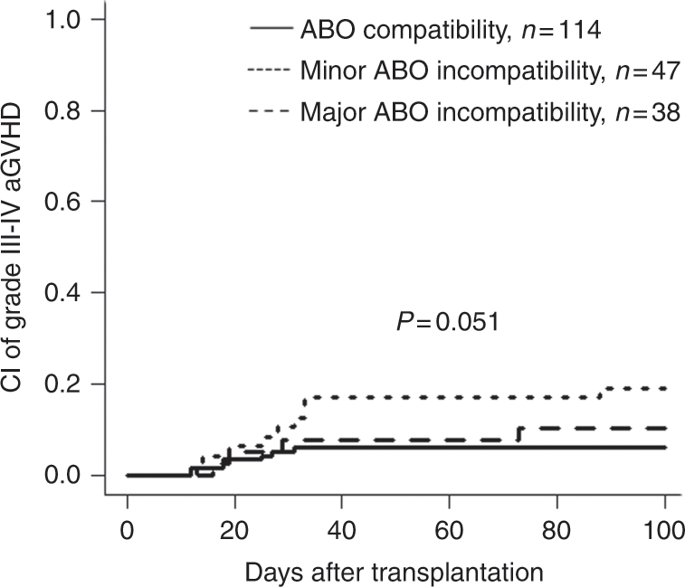Bone Marrow Transplantation ( IF 4.5 ) Pub Date : 2020-01-13 , DOI: 10.1038/s41409-020-0779-7 Yan-Ru Ma 1 , Wen-Jing Wang 1 , Yi-Fei Cheng 1 , Yuan-Yuan Zhang 1 , Xiao-Dong Mo 1 , Ting-Ting Han 1 , Feng-Rong Wang 1 , Chen-Hua Yan 1 , Yu-Qian Sun 1 , Yu-Hong Chen 1 , Jing-Zhi Wang 1 , Fei-Fei Tang 1 , Wei Han 1 , Yu Wang 1 , Xiao-Hui Zhang 1 , Xiao-Jun Huang 1, 2 , Lan-Ping Xu 1

|
The impact of ABO incompatibility on transplantation outcomes in severe aplastic anemia (SAA) patients receiving haploidentical hematopoietic stem cell transplantation (HSCT) remains controversial without published data. A total of 199 SAA patients receiving haploidentical HSCT from ABO-matched (n = 114), minor ABO-incompatible (n = 47), or major ABO-incompatible donors (n = 38) were included in this study. The median time and cumulative incidences of both myeloid and platelet engraftment in the ABO-compatible and ABO-incompatible groups were similar, and pure red cell aplasia was absent. Minor ABO incompatibility increased the rate of grade III–IV acute graft-versus-host disease (aGVHD) (ABO compatible: 6.14 ± 0.05%, minor incompatible: 19.15 ± 0.34%, and major incompatible: 10.53 ± 0.25%; P = 0.051), but did not influence the rates of grade II–IV aGVHD or chronic GVHD (cGVHD). Minor ABO-incompatibility was identified as an independent risk factor for grade III–IV aGVHD by multivariate analysis (hazard ration (HR) = 4.00 (1.48–10.80), P = 0.006). Chronic GVHD, mortality, and treatment failure were not increased in the minor ABO-incompatible group. For SAA patients receiving haploidentical HSCT, ABO compatible donors are better than ABO minor incompatible donors if several haploidentical donors are available.
中文翻译:

ABO血型不合对重度再生障碍性贫血半相合造血干细胞移植术后结局的影响
在没有公布数据的情况下,ABO 血型不合对接受半相合造血干细胞移植 (HSCT) 的严重再生障碍性贫血 (SAA) 患者的移植结果的影响仍然存在争议。共有 199 名 SAA 患者接受来自 ABO 匹配(n = 114)、次要 ABO 不相容(n = 47)或主要 ABO 不相容供体(n = 38) 被纳入本研究。ABO 相容组和 ABO 不相容组骨髓和血小板植入的中位时间和累积发生率相似,并且不存在纯红细胞再生障碍。轻微的 ABO 不相容增加了 III-IV 级急性移植物抗宿主病 (aGVHD) 的发生率(ABO 相容:6.14 ± 0.05%,轻微不相容:19.15 ± 0.34%,严重不相容:10.53 ± 0.25%;P = 0.051 ),但不影响 II-IV 级 aGVHD 或慢性 GVHD (cGVHD) 的发生率。通过多变量分析(风险比(HR)= 4.00(1.48-10.80),P = 0.006)。次要 ABO 不相容组的慢性 GVHD、死亡率和治疗失败没有增加。对于接受单倍体相合 HSCT 的 SAA 患者,如果有多个单倍体相合供体,ABO 相容供体优于 ABO 次要不相容供体。









































 京公网安备 11010802027423号
京公网安备 11010802027423号